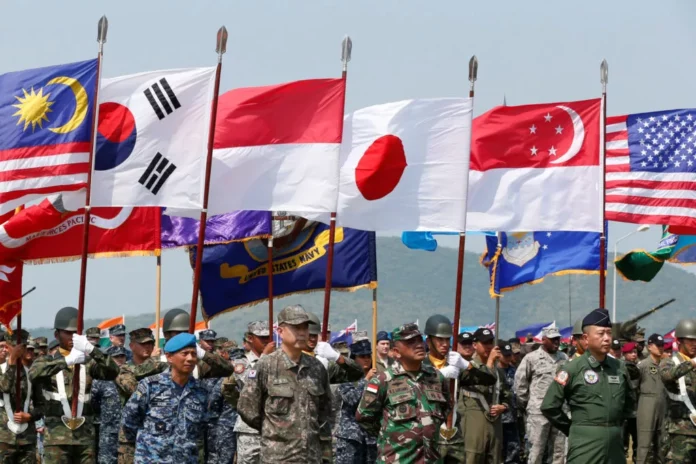|
Listen to article
|
Asian markets traded unevenly on Wednesday, March 19, 2025, as gold soared to yet another peak, driven by mounting fears of a trade war and a resurgence of geopolitical tensions that overshadowed other global developments.
The day’s hesitant opening came on the heels of a tech-driven downturn on Wall Street, while news of a U.S.-Russia deal—brokered by Presidents Donald Trump and Vladimir Putin—to spare Ukraine’s energy grid from attacks barely registered with investors, eliciting little more than a collective shrug.
The Japanese yen ticked higher against the dollar after the Bank of Japan opted to hold interest rates steady, issuing a cautious note about the future amid “significant unknowns,” including the ripple effects of international trade frictions.
Attention now turns to pivotal monetary policy calls looming in the United States, the United Kingdom, and Indonesia—where stocks cratered Tuesday amid growing unease over the nation’s economic health.
Earlier in the week, Asian exchanges had enjoyed a robust lift from China’s renewed vows to bolster domestic spending, paired with encouraging U.S. data that calmed recession jitters. But, the erratic nature of Trump’s trade agenda—imposing tariffs on some allies while holding off on others—has injected a persistent layer of doubt into the markets.
No fresh tariff announcements have emerged recently, but all eyes are fixed on April 2, when broad reciprocal measures are slated to take effect. U.S. Treasury Secretary Scott Bessent, speaking on Fox Business’s Mornings With Maria, outlined the approach: each trading partner will be handed a figure reflecting Washington’s assessment of their trade barriers.
Read also: AI: Major Bank In South-East Asia To Cut 4,000 Jobs
“We’ll sit down with them and say, here’s our take on your tariffs, your non-tariff restrictions, your currency practices, your subsidies, and your labor policies,” he explained, signaling a calculated push to reset global trade dynamics.
Many economists have warned that the tariffs — which are being met with retaliation by some countries — will tip the US economy, and possibly others, into recession.
With that in mind, the Federal Reserve’s policy meeting, which ends later Wednesday, is being closely followed by traders hoping for an idea about officials’ plans to deal with any negative impact.
The Bank of Japan, as expected, stood pat on interest rates, having hiked them last month amid concerns over the outlook, particularly with regard to trade.
“There remain high uncertainties surrounding Japan’s economic activity and prices, including the evolving situation regarding trade,” the bank warned in a statement after its announcement.
Stefan Angrick of Moody’s Analytics wrote in a note ahead of the decision that “a wave of tariff measures and threats from Washington have kept financial markets on edge”.
The yen rose against the dollar, having weakened in earlier trade, while Japan’s Nikkei 225 stock index also advanced.
Elsewhere in Asia, Hong Kong, Seoul, Singapore, Manila and Bangkok also edged up. Jakarta gained more than one per cent, clawing back some of the painful losses suffered Tuesday, when it shed more than seven per cent at one point on economic fears.
Stock markets in Shanghai, Sydney, Wellington, Taipei, and Mumbai slipped lower on Wednesday, March 19, 2025, while gold surged to a new peak of $3,039, fueled by jitters over a potential flare-up in the Middle East after Israel unleashed its heaviest bombardment of Gaza since a ceasefire with Hamas began.
That unease rippled across to Wall Street, where the three major indexes slid back into a downturn, erasing two days of gains as worries about global stability took hold once more.
High-stakes talks between U.S. President Donald Trump and Russia’s Vladimir Putin yielded no sweeping ceasefire, with Putin agreeing only to pause strikes on Ukraine’s energy grid for 30 days—a limited concession that left broader peace hopes unmet.
The White House framed the discussion as “constructive and positive,” but in Kyiv, Ukrainian President Volodymyr Zelensky vowed to press on with operations in Russia’s Kursk region, signaling no letup in the fight.
U.S. envoy Steve Witkoff, speaking to Fox News, revealed that another round of negotiations is set for Sunday in Jeddah, keeping diplomatic channels alive despite the deadlock.
Though Chris Weston of Pepperstone Group offered a sobering take: “The Russia-Ukraine talks drag on, but there’s little sign of a real breakthrough or a deal that sticks,” capturing the market’s skepticism about a lasting resolution.
























